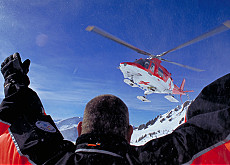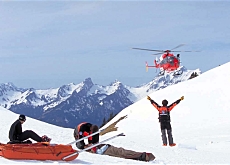Air rescue service gears up for winter

With record snowfalls heralding the start of a long winter in Switzerland, the air rescue service Rega is preparing to face a busy winter sports season.
More than a quarter of Switzerland’s population are members of Rega, secure in the knowledge that its helicopters can reach the scene of an accident anywhere in the country in 15 minutes.
In the second weekend of November Switzerland saw the largest amount of snow to fall at the start of winter for over five decades, and the wintry weather is set to continue. Between 50cm and 150cm has accumulated in most parts of the Swiss Alps.
The Swiss Federal Institute of Snow and Avalanche Research last week warned of “considerable avalanche danger” on the northern flanks of the Alps.
A number of the country’s alpine passes are now closed for the winter and motorists are being warned to drive with caution in affected areas.
The ski season, which traditionally starts in the first week of December, has already begun in numerous resorts. This will mean more work for Rega’s ten helicopter bases.
Winter is the busiest time for the air rescue service, Thomas Kenner of Rega told swissinfo. “When you have good conditions in the mountains with nice weather, lots of snow and holiday time, we can have up to 140 interventions in one weekend,” Kenner said.
On alert
Rega’s fleet of helicopters is available all year round to airlift members of the public in distress needing medical attention. The service also has three ambulance jets at its disposal to repatriate ill or injured Swiss from abroad.
“We always have the same level of alert. Our ten Rega bases are on stand-by 24 hours a day with crews ready to leave within five minutes during the day and 20 minutes at night time. There’s always a pilot, a rescue worker and a doctor on duty,” Kenner explained.
Rega rescued more than 8,000 people by helicopter in 2006. More than a quarter were mountain rescues and a further 1,000 were traffic accidents. The most high-profile case the rescuers were involved in was the death of six army recruits in an avalanche on the Jungfrau in July. Eight men were rescued unharmed that day.
As a member of the Red Cross, Rega offers help to anyone in need on Swiss soil but in the case of members who pay a small annual fee, the foundation writes off any costs not covered by the person’s own insurance.
In July, the Rega rescue service was voted the company with the best corporate image among the Swiss. The study by the IHA-GfK research institute spoke to 3,500 respondents and covered 100 organisations from 12 sectors.
Non-profit
As a non-profit foundation, Rega is considered to be one of a kind. Other countries tend to have state-run rescue systems. Rega helicopters also transport organs, important medical supplies and specialists.
“We have almost two million members or donors who pay something every year which allows us to offer this quite expensive service. Without the members it would not be possible to do this,” Kenner said.
When people are trapped in an avalanche, time is of the essence, and Rega has teams of dogs at its disposal organised by its partner the Swiss Alpine Club.
“It’s very important that the dogs are on the scene of an avalanche as soon as possible after the accident because every minute counts.
“The club is very well organised and has a good alarm system so when we have an avalanche we can get the dogs up to the location within minutes. The dogs are trained to be used to flying in helicopters,” Kenner added.
During the summer months spent in the alpine pastures, cattle are also among Rega’s “patients”. As part of the assistance programme for mountain farmers, Rega rescues injured, trapped or dead livestock from rough terrain and transports them to the nearest location that can be reached by an overland vehicle.
Numbers of injured people transported by Rega in 2006:
Winter sports accidents – 1,514
Traffic accidents -1,050
Work accidents – 908
Mountain accidents – 716
Sports accidents – 349
Plane accidents – 102
Avalanches – 60
In the event of an accident or serious illness in Switzerland, anyone can ask Rega for assistance 24 hours a day, 365 days a year, by calling its emergency number 1414 (within Switzerland) or via emergency radio (emergency channel 161.300 MHz).
Based on the location and the diagnosis, the operations centre at the Rega centre at Zurich-Kloten Airport alerts the nearest helicopter base which has a helicopter in the air within five minutes.
In addition to missions to the scene of an accident (primary missions), Rega helicopters transfer patients who are already receiving medical care from one hospital to another (secondary missions).
Rega also transports organs, blood, medication and medical specialists. In the summer helicopters carry out flights to assist mountain farmers with their livestock.
Winter sports are risky, according to a new snow safety campaign by the Swiss Council for Accident Protection – Protect yourself – which reminds the public that there are on average 1,000 such accidents per day of the winter season in Switzerland.
The campaign encourages people to wear helmets when on the slopes, an accessory that reduces the risk of head injuries by 75 per cent.
Another part of the body that can be well protected is the wrist. Wrist protectors reduce the risk of injury by 80 per cent.
Knee injuries are most common in skiing accidents, and the campaign points out that well-fitted skis and boots significantly reduce the risk of knee and leg injury.

In compliance with the JTI standards
More: SWI swissinfo.ch certified by the Journalism Trust Initiative












You can find an overview of ongoing debates with our journalists here . Please join us!
If you want to start a conversation about a topic raised in this article or want to report factual errors, email us at english@swissinfo.ch.